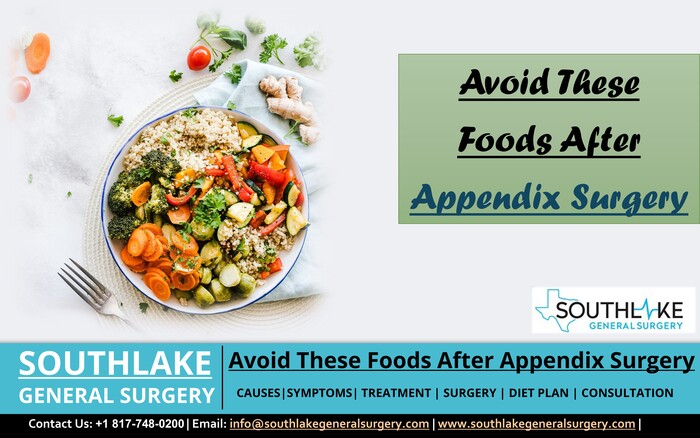You should Avoid These Foods After Appendix Surgery to reduce abdominal pain and improve digestion, even if your appendix does not play a significant role in digestion and you may not need to make any permanent adjustments to your diet.
The inflammation of the appendix, also known as appendicitis, is the most prevalent ailment affecting the abdomen that calls for immediate surgical intervention.
If you’ve had appendicitis and are recovering from surgery, you should discuss your dietary needs with your doctor.
Food that Helps in Appendix Recovery
Doctors typically allow patients to start sipping water as soon as they come out of anesthesia, however, they may wait for the patient to regain consciousness before allowing them to drink a whole glass. Soups and yogurt are good examples of simple, easy-to-digest foods that could be a good place to start whenever you’re ready to eat again.
Following abdominal surgery, you may find that you have a difficult time digesting solid meals. If this is the case, your doctor may recommend that you go to a liquid diet, which consists of liquids and meals that turn to liquid when they are brought to room temperature. Smoothies, shakes, broth, and soups are all possible food options on a liquid-only diet.
When you’re on a liquid diet, solid food is off-limits. Anything that needs to be chewed thoroughly, such as
- fresh or frozen vegetables and fruits
- whole grains
- lean meats
- fish and eggs,
- beans
- bread
- cold cereal
- rice
- pasta
- nuts, and seeds.
You won’t be able to eat regular meals until your doctor advices you to eat.
Avoid Foods High in Fat
According to Dr. Valeria Simone MD, an experienced general surgeon at Southlake General Surgery, Texas, suggests beginning with bland, low-fat meals such as plain pasta, mashed potatoes, rice, bananas, and cottage cheese immediately after an appendectomy.
In the days following surgery, you should avoid eating anything too fatty or too heavy, as doing so can cause nausea and diarrhea. But not everyone has this problem, and many may be able to resume their regular diet shortly after appendix removal.
Increase Your Fiber Intake
To avoid constipation after appendix surgery, it is recommended that you consume a high-fiber diet. Seeds, beans, a wide variety of fruits and vegetables, cereals, whole-grain bread, and pasta are all good sources of fiber.
You should discuss your symptoms with your doctor if you are experiencing appendix-related constipation and are finding it difficult to eat after the appendectomy. Your doctor can probably recommend a stool softener and steer you toward palatable meals and beverages.
Gradually Adopt a Healthier Diet
The duration of recuperation from appendicitis surgery varies. Appendectomy can be performed either laparoscopically (via a small incision) or openly (through a large incision), as explained by Dr. Valeria Simone MD. The patient can go home the day following surgery, and by the end of two weeks, you should feel well enough to return to your regular activities.
After you’ve started feeling better, focus on eating nutritious foods like eggs and peppers, which are good protein and vitamin C sources. To get the recommended daily amount of fiber, which is between 20 and 35 grams, eating more fruits, vegetables, whole grains, beans, nuts, and seeds can help.
Appointment
For more information on “Avoid These Foods After Appendix Surgery”, Diet Plan or consultation with Dr. Valeria Simone MD at Southlake General Surgery, Texas. Contact our healthcare expert today at +1(817) 748-0200.

